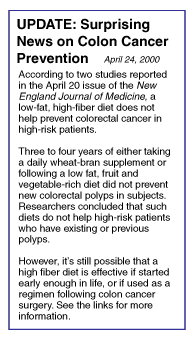Curable if Caught
Colon cancer screening can save your life
Note: Article updated April 24, 2000. See sidebar below.
The other day as I walked through the airport to catch a flight, I spotted Katie Couric's picture on the cover of Time at the newsstand and stopped to buy the magazine. I have long been a fan of Katie Couric; she seems naturally curious when she interviews people and has a nice "down to earth" quality about her. It turned out that the article was not about Couric the journalist -- but about Couric the widow. Two years ago, her husband died tragically of colon cancer. He was only 42. Because colon cancer is one of the most preventable malignancies, Couric has vowed to fight the disease through education.
According to the American Cancer Society, approximately 130,000 new cases of colorectal cancer (an umbrella term that refers to both colon and rectal cancers) are diagnosed in the United States each year. Colorectal cancer kills 56,000 Americans every year, making it the second leading cause of cancer death, behind lung cancer. The disease strikes both men and women. The Time article emphasizes that many relatively young people are affected by the disease, with 25 percent of the deaths occurring in individuals under age 50. In the vast majority of cases, however, colorectal cancer is curable if it is detected early. In fact, cancer experts claim the death toll could be cut in half with early detection.
Screen early and often
The best way to beat colorectal cancer, according to most experts, is to detect it before it has a chance to spread to vital organs, such as the liver. Most people should start getting screened for colorectal cancer at the age of 50. Those with a family history of the disease, however, should start earlier. So if you have colon cancer in your family, inform your physician; he or she will tell you when it is appropriate to begin screening.
There are three commonly used screening tests for colorectal cancer, and they all involve a rectal exam, which is less uncomfortable than it sounds. Your physician can be trusted to make the procedures described below as painless and swift as possible.
In most people a simple stool test that detects microscopic blood, together with a test called a sigmoidoscopy (in which a small fiber-optic tube is inserted into the lower part of the large intestine), is enough. Most doctors recommend the stool test every year, but the sigmoidoscopy should be performed every five years.
A more conclusive test is a barium enema, which involves taking a series of abdominal X rays after barium (a contrast medium that shows up on X rays) is inserted into the rectum. This test allows doctors to view, through X ray, the entire colon.
The most conclusive test is called a colonoscopy. This test also involves the insertion of a fiberoptic tube through which the physician can directly view the entire colon.
There is some controversy about which tests should be performed and how often they should be done. Insurance companies will typically pick up the tab for the stool test and for the sigmoidoscopy. But they generally do not pay for barium enemas and colonoscopies, unless the patient has a family history or suspicious symptoms.
Symptoms to watch for
A change in bowel habits lasting more than a few days, blood in the stool, prolonged abdominal bloating or pain, and excessive fatigue are all possible indications that cancer might be lurking. If you have any of these symptoms, contact your doctor promptly.
If you feel fine and simply want to do everything you can to prevent colorectal cancer, consider the following tips:

There is evidence that eating plenty of fruits and vegetables, cutting down on fat intake, and increasing the amount of fiber in your diet reduces the risk of colorectal cancer. (see sidebar for update)
People who exercise regularly, especially joggers, seem to have a lower risk of developing the disease.
Begin screening starting at age 50, or earlier if you have symptoms or a family history of the disease.
The Time article mentions that Katie Couric underwent a colonoscopy examination on the air, during which her viewers were able to see what the test was like and what the inside of a colon looked like. If she can do that, you can be sure you'll survive the embarrassment of a private exam. It could save your life.
Related links:
New England Journal of Medicine's website
National Cancer Institute's updated recommendations for high-risk colon cancer patients

